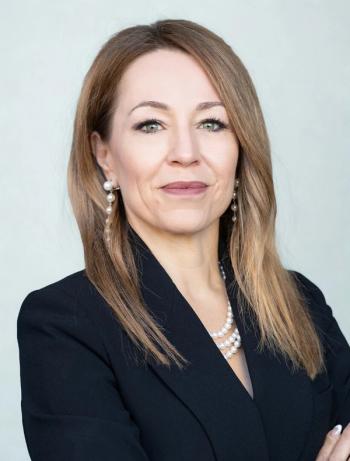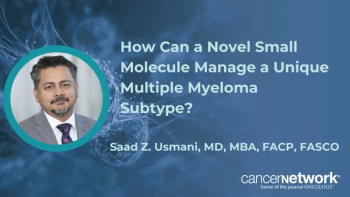
FDA ODAC Votes in Favor of Belantamab Mafodotin Monotherapy in Patients with Multiple Myeloma
The committee voted 12-0 in favor of the demonstrated benefit of belantamab mafodotin as monotherapy outweighing the risks for patients with relapsed or refractory multiple myeloma who have received at least 4 prior therapies.
The FDA Oncologic Drugs Advisory Committee (ODAC) voted 12-0 in favor of the demonstrated benefit of belantamab mafodotin as monotherapy outweighing the risks for patients with relapsed or refractory multiple myeloma who have received at least 4 prior therapies including an immunomodulatory agent, a proteasome inhibitor, and an anti-CD38 antibody, according to GlaxoSmithKline (GSK), the developer of the agent.1
The vote was based on data from the DREAMM (Driving Excellence in Approaches to Multiple Myeloma) clinical trial program, which includes the pivotal DREAMM-2 study which enrolled heavily pre-treated patients who had actively progressing multiple myeloma that had worsened regardless of the current standard of care. The 6-month primary results from the study were published in The Lancet Oncology and serves as the basis for the biologics license application (BLA).
Notably, 2 committee members could not participate in the final vote.
“We are pleased the committee recognized the potential for belantamab mafodotin to help patients who have relapsed or refractory multiple myeloma, an incurable disease with limited treatment options,” Axel Hoos, MD, PhD, senior vice president and head of Oncology R&D at GSK, said in a press release. “We look forward to working with the FDA as they complete their review of our Biologics License Application.”
The double-arm, randomized, open label, phase 2 DREAMM-2 study randomized patients to 2 arms to receive either 2.5 mg/kg or 3.4 mg/kg of belantamab mafodotin every 3 weeks. Patients included in the trial generally had more advanced disease, poorer prognosis, and performance status, and also had a greater number of prior lines of therapy in comparison with those included in DREAMM-1, the first in-human study of belantamab mafodotin.
Overall, 293 patients were screened for the study and 196 were included in the intention-to-treat population (97 in the 2.5 mg/kg cohort and 99 in the 3.4 mg/kg cohort).2 As of June 21, 2019, the primary analysis data cutoff date, 30 (31%; 97.5% CI, 20.8-42.6) patients in the 2.5 mg/kg cohort and 34 (34%; 23.9-46.0) patients in the 3.4 mg/kg cohort had achieved an overall response.
The most common grade 3-4 adverse events (AEs) observed in the safety population were keratopathy (in 26 [27%] of 95 patients in the 2.5 mg/kg cohort and 21 [21%] of 99 patients in the 3.4 mg/kg cohort), thrombocytopenia (19 [20%] and 33 [33%]), and anemia (19 [20%] and 25 [25%]). Moreover, 38 (40%) patients in the 2.5 mg/kg cohort and 47 (47%) in the 3.4 mg/kg cohort reported serious adverse events. Importantly, 2 deaths were potentially treatment related (1 case of sepsis in the 2.5 mg/kg cohort and 1 case of hemophagocytic lymphohistiocytosis in the 3.4 mg/kg cohort).
Belantamab mafodotin is not currently approved for use anywhere in the world. The FDA granted breakthrough therapy designation to belantamab mafodotin in 2017 and priority review designation for the BLA earlier this year. A marketing authorization application for belantamab mafodotin is also currently under accelerated assessment by the European Medicines Agency.
References:
1. GSK announces FDA advisory committee votes in favour of positive benefit/risk profile for belantamab mafodotin for patients with relapsed/refractory multiple myeloma [news release]. London, UK. Published July 14, 2020. gsk.com/en-gb/media/press-releases/gsk-announces-fda-advisory-committee-votes-in-favour-of-positive-benefitrisk-profile-for-belantamab-mafodotin-for-patients-with-relapsedrefractory-multiple-myeloma/. Accessed July 15, 2020.
2. Lonial S, Lee HC, Badros A, et al. Belantamab mafodotin for relapsed or refractory multiple myeloma (DREAMM-2): a two-arm, randomized, open-label, phase 2 study. The Lancet Oncology. doi:10.1016/S1470-2045(19)30788-0.
Newsletter
Stay up to date on recent advances in the multidisciplinary approach to cancer.





































